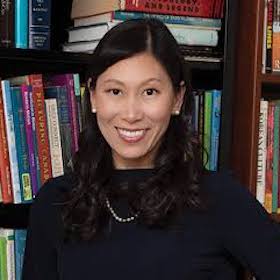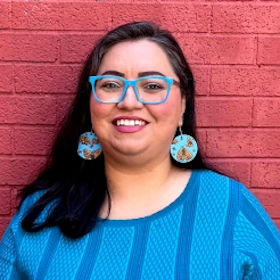Diversity
Why SIS Values Diversity
As the demography of communities across America continues to change, it is increasingly significant to create and promote diversity within the information profession to better serve our communities. Diversity is one of the five core values of the American Library Association (ALA). ALA believes attaining a workforce that is richly diverse will assist in providing the highest quality of information services to all people in libraries and other information institutions. Contributing to creating a diverse workforce, ALA created several scholarships and programs to recruit and retain librarians from historically underrepresented backgrounds.
SIS supports this value and strives to build a culture that encourages diversity and inclusion. SIS is part of one of the most racially and culturally diverse campuses in the country. Wayne State University is a prominent member of the Midtown community. Our community includes Detroit's cultural center, the home of several cultural institutions including the Detroit Institute of Art and the Detroit Historical Museum. Additionally, campus is just minutes away from several other culturally distinguished cities such as Hamtramck and Dearborn. Individuals matriculate at Wayne State from all over the world for an urban educational experience. Irrespective of the program of study, Wayne State University truly offers a world class education.
Read the school's 2023-28 Diversity, Equity, Inclusion and Accessibility Plan.
Diversity and Inclusion at Wayne State University
At Wayne State University, we welcome all people and understand that their unique experiences, talents and perspectives make us a stronger organization and better individuals. The university has a long history of meaningful engagement with society, with diversity and inclusion a core value in both our mission and our strategic plan.
Wayne State is remarkable for many things, but our ability to open doors to people of all backgrounds, races, creeds and walks of life is our proudest legacy. And our unwavering commitment to diversity, inclusion and social justice continues to be our North Star.
Visit the WSU Diversity and Inclusion website for more information on university initiatives, programs and offices.
SIS Diversity Initiatives
Through a concerted effort, research, and dedication, SIS believes the goals of developing an inclusive environment and increasing the representation of underrepresented groups will be reached. Listed below are diversity-related initiatives supported by the school.
Beyond Barriers: Conversations on Equity in Information Conference 2024
Topic: Diverse Youth Literature
The School of Information Sciences will host its first Beyond Barriers: Conversations on Equity in Information Conference from 11 a.m. to 2 p.m. ET on Thursday, April 4.
The topic of this virtual mini conference is Diverse Youth Literature and will feature guest speakers, student presentations and a faculty panel discussion.
Register today to receive a link to the Zoom event.
Featured Speakers:
Desiree Cooper
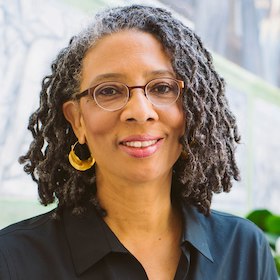 A 2015 Kresge Artist Fellow, Desiree Cooper is a former attorney, Pulitzer Prize-nominated journalist and community activist. She is an evocative speaker on the themes of racial and gender equality, reproductive freedom, family-positive public policy and the welfare of women and girls.
A 2015 Kresge Artist Fellow, Desiree Cooper is a former attorney, Pulitzer Prize-nominated journalist and community activist. She is an evocative speaker on the themes of racial and gender equality, reproductive freedom, family-positive public policy and the welfare of women and girls.
Cooper’s latest publication is a children’s picture book, Nothing Special, published by the Wayne State University Press. The book is based upon the friendship between her father and grandson. It has earned a starred review from Booklist, inclusion in the New York Public Library’s list of the Top Ten Children’s Books of 2022, and winner of the 2023 Paterson Prize for Books for Young People. She was a founding board member of Cave Canem, a national residency for black poets, and has received residencies at Kimbilio and Ragdale.
Having forged a 30-year career in Detroit, she now lives in the Virginia Beach area where she cares for her aging mother and raises her three grandchildren.
Sarah Park Dahlen
Sarah Park Dahlen joined the School of Information Sciences at the University of Illinois as an associate professor in August 2021. She previously served as an associate professor of library and information science at St. Catherine University in St. Paul, Minnesota.
Dahlen's research addresses Korean adoption in children’s literature, Frank Carpenter and Frances Carpenter’s writings for children, and diversity in children's literature and library education. She is co-editor of the scholarly journal Research on Diversity in Youth Literature, with Sonia Alejandra Rodríguez; co-editor of Harry Potter and the Other: Race, Justice, and Difference in the Wizarding World (2022) with Ebony Elizabeth Thomas; and co-creator of the 2015 and 2018 Diversity in Children's Books Infographics, with David Huyck, which are based on data from the Cooperative Children's Book Center at the School of Education, University of Wisconsin-Madison.
Her honors include the Leadership Award from the iSchool's Alumni Association (2016), Faculty Teaching and Advising Award from St. Catherine University (2021), and the Mentoring Award from the Children's Literature Association (2021). She has served on several children's book award committees, including the National Book Award jury for Young People's Literature, and curates the youth literature programming at the Asian American Literature Festival hosted by the Smithsonian Asian Pacific American Center and the Library of Congress.
Mimi Olson
 Melissa "Mimi" Olson is an award-winning writer recognized as a Highlights Author of the Month. Olson’s debut novel Middle School is No Place for Magic, published by Fifth Avenue Press, was listed as an Amazon Hot New Release, #1 in the Teen and YA Fiction Category: Being a Teen. A former journalist and communications specialist, Mimi has been writing, presenting, and developing workshops for over 25 years. Her current workshop is a creative writing workshop for middle schoolers titled Finding Your Spark! that is available both in-person and virtually. Publications include pieces in Metro Parent, Jack and Jill, High Five Magazine, Pulse, and Highlights. Mimi lives in Ann Arbor with her husband, daughter, and two very spoiled cats.
Melissa "Mimi" Olson is an award-winning writer recognized as a Highlights Author of the Month. Olson’s debut novel Middle School is No Place for Magic, published by Fifth Avenue Press, was listed as an Amazon Hot New Release, #1 in the Teen and YA Fiction Category: Being a Teen. A former journalist and communications specialist, Mimi has been writing, presenting, and developing workshops for over 25 years. Her current workshop is a creative writing workshop for middle schoolers titled Finding Your Spark! that is available both in-person and virtually. Publications include pieces in Metro Parent, Jack and Jill, High Five Magazine, Pulse, and Highlights. Mimi lives in Ann Arbor with her husband, daughter, and two very spoiled cats.
Sonia Alejandra Rodriguez
Sonia Alejandra Rodriguez (she/they) is a Professor in the English Department at LaGuardia Community College, CUNY, where they teach composition, literature, and creative writing.
Sonia Alejandra received their Ph.D. in English from the Department of English at the University of California, Riverside. Their research introduces “conocimiento narratives” as a way to read realist fiction within Latinx children’s and young adult literature. They are currently working on a monograph on this topic.
Sonia Alejandra earned an MFA in Creative Writing (Fiction) from The City College of New York (CUNY). They’ve participated in writing workshops at Tin House, VONA, and Kweli.
Questions about the event can be directed to SIS DEI Program Planning Chair Amber Case (they/she) at acase@wayne.edu.
Future Librarians for Diversity and Inclusivity (FLID)
Future Librarians for Inclusivity and Diversity (FLID) provides a safe space for future Information science professionals to gain a better understanding of diversity within the profession and underserved populations in preparation for working with individuals from these groups.
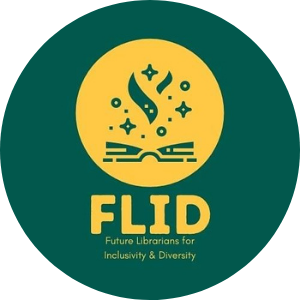 The purpose shall be effectuated through:
The purpose shall be effectuated through:
- Exposing SIS students to diverse cultures, lifestyles, and physical abilities by promoting and organizing both on-campus events and off-campus events and excursions.
- Organizing extracurricular educational opportunities for SIS students. (i.e. teach-ins, workshops, lectures, etc.)
- Holding regular discussion forums for SIS students to respectfully exchange ideas about diversity and inclusion issues in the information field.
- Promoting awareness of the information sciences profession among underrepresented group
For more information about FLID, check out the group on Facebook and Instagram.
Past Diversity Projects
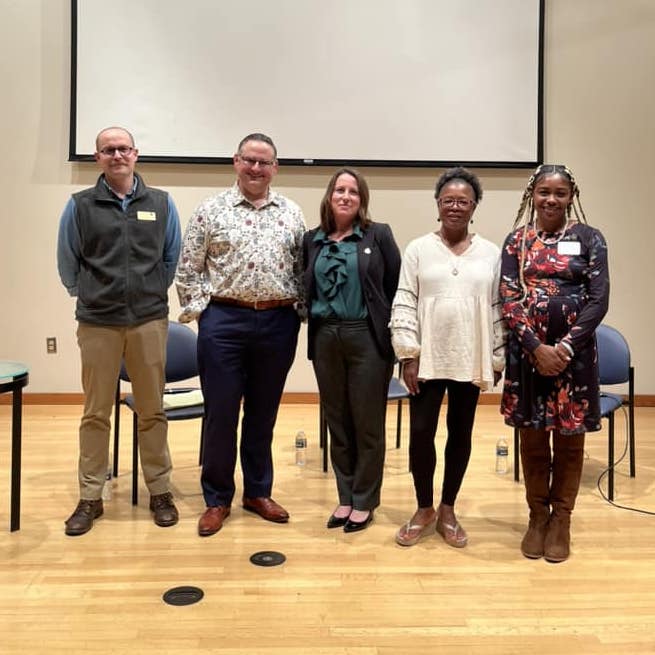
Defending Access: Librarian Perspectives on Banned Books
When intellectual freedom is at risk, librarians are often on the front lines of protecting communities’ access to information. School of Information Sciences alumni shared their experiences and what they’re doing to defend our right to read at a panel discussion hosted by the school's Diversity, Equity and Inclusion (DEI) Program Planning Committee on October 4, 2023.
The panel discussion featuring alumni librarians was held both in-person at the Bernath Auditorium in Wayne State University's David Adamany Undergraduate Library and virtually via Zoom. Read about the event's moderator, host and panelists here and watch a recording of the event here.
Project RUSL, Restoring Urban School Libraries
Wayne State University School of Information Sciences Associate Professor Kafi Kumasi was awarded an IMLS Laura Bush 21st Century Librarian Program award of $247,152 for "Project RUSL: Restoring Urban School Libraries." The project provided education and professional development for six diverse classroom teachers who work in the Harper Woods and River Rouge school districts. The project's goal was to have the teachers become certified school librarians and build capacity to restore the school libraries in their respective buildings.
Project RUSL also built a video library of evidence-based practices of school librarianship and culturally responsive pedagogy based on Kumasi's InFLOmation model, a hip-hop inquiry-based approach to school library instruction that helps capture and facilitate youth's culturally specific information-creating behaviors in ways that mimic and flow out of hip-hop culture.
Project IDoL
Project IDoL, which ran from 2013-2016, is a collaboration between the Wayne State University School of Information Sciences and the Historically Black Colleges and Universities (HBCU) Library Alliance. WSU SIS and the HBCU Library Alliance have received funding from the IMLS Laura Bush 21st Century Librarian Program to increase the diversity of the library profession. In this project, the two partner organizations are recruiting, mentoring, and providing an online Master of Library and Information Science degree to 10 students from historically underrepresented groups in order to achieve greater diversity among practicing library professionals. SIS provides the education with its online MLIS format and the HBCU Library Alliance assists with recruitment and retention by overseeing mentorship of the selected students by library professionals with senior level experience and prior mentorship training.
All Project IDoL students were recruited in the Spring of 2014 and began their studies in Fall 2014.
Complete details about Project IDoL are available on its website: idol.sis.wayne.edu
Project ALFA
Project ALFA, which operated from 2011-2013, was a partnership between Wayne State University, the University of Alabama, the Alabama Public Library Service, and the Florida Department of Education Bureau of Braille and Talking Book Library Services. Project ALFA was a specialization within an ALA-accredited Master's degree program centered on a philosophy of service to a diverse community. It was designed to do so by providing 30 masters degree fellowships. Project ALFA sought to prepare library and information center professionals who will lead the way in spreading a universal access philosophy as the population of Information seekers with physiological challenges is increasing rapidly due to the graying of American among other factors.
Project ALFA fellows were prepared to serve an aging population of information seekers, connecting them to information through various technologies in all types of library and information agencies. Project ALFA Fellows disseminate and diffuse the ALFA philosophy in the organizations where they will work through daily work flow as well as through more formal channels such as in-service and continuing education with colleagues in this field, at professional conferences, and special projects.
Fellows learned to incorporate a universal access philosophy into most areas of library and information services, including the use of assistive technologies and other information and communication technologies (ICTs). More details can be found here.
Library Issues Mini-Summit: Diversity
The "Library Issues Mini-Summit" was hosted by the faculty of the School of Information Sciences on September 24, 2009. The focus of the mini-summit, co-hosted by the School's Diversity Council, was "Diversity in Libraries." Over fifty librarians and information professionals from across the region came together to consider how to recruit a more diverse workforce to the library and information professions, how the School can recruit more students from under-represented groups, and how to infuse a consideration of diversity issues across the MLIS curriculum.
The morning keynote presentation by Ms. Sandra Phoenix, Director of the Historically Black Colleges and Universities Library Alliance in Atlanta, discussed how to recruit a more diverse student body.
The luncheon keynote presentation by Ms. Nonie Price, Alumni Relations and Continuing Education Coordinator for the University of South Carolina School of Library and Information Science, discussed the opportunities and challenges of involving library professionals in her School's diversity recruitment and retention efforts.
